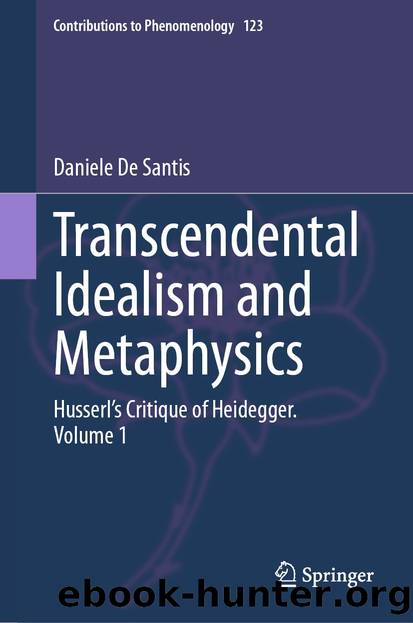Transcendental Idealism and Metaphysics by Daniele De Santis

Author:Daniele De Santis
Language: eng
Format: epub
ISBN: 9783031395864
Publisher: Springer Nature Switzerland
Husserlâs notes and comments on these paragraphs testify to the great attention he must have paid to the issues here discussed by Heidegger. He himself remarks, for example, âThe understanding of being <is> the innermost essence of finitude?â (Husserl, 1994c, 63; 1997, 468). Later on, he also points out, âNB. Earlier it was said [that Dasein is what it is] upon the basis of understanding of being, so Dasein would seem to be identical with the understanding of beingâ (Husserl, 1994c, 63; Husserl, 1997, 468); âSo Dasein in human beings = understanding-of-being!â (Husserl, 1994c, 63; 1997, 469). All these remarks show to what extent, during the reading of Kant and the Problem of Metaphysics, Husserl must have been under the (quite justified) impression that das Seinsverständnis is the beating heart of the âanalytics of Dasein.â
Contrary to how Stein understands the relation between finitude and Seinsverständnis (Daseinâs finitude is what grounds das Seinsverständnis (Stein, 1962, 21)), Husserl is aware that the two are equivalent. Heidegger writes, âThe question of being arises from the pre-conceptual understanding of being, as a question concerning the possibility of the concept of beingâ (Heidegger, 1965, 233; 2010b, 226). Husserlâs convoluted commentary reads as follows:
What is at issue here, however, is not the possibility, essence, or concept of being, but rather the psychological and, and because it is so difficult, the transcendental possibility of an entity as such also being an entity for us; that is to say, with the not yet conceptually grasped, the not yet systematically investigated constituting subjectivity, and also the essential unity of that which has arisen out of naive, lived, but un-thematized constitution, <i.e. > which is simply and exclusively for us as something that exists (entities and their concepts) with transcendentally functioning subjectivity <;> and on the basis of this, <what further concerns us is the possibility> of a concrete, full grasp of the essence of the being or thing, a grasp which leaves open no question of essence for beings-as-such and for the entity with world; <all> this <is contained> in the necessary transition to the totality and its necessity (Husserl, 1994c, 60â61; 1997, 464).
Download
This site does not store any files on its server. We only index and link to content provided by other sites. Please contact the content providers to delete copyright contents if any and email us, we'll remove relevant links or contents immediately.
| Deconstruction | Existentialism |
| Humanism | Phenomenology |
| Pragmatism | Rationalism |
| Structuralism | Transcendentalism |
| Utilitarianism |
The remains of the day by Kazuo Ishiguro(9000)
Tools of Titans by Timothy Ferriss(8398)
Giovanni's Room by James Baldwin(7347)
The Black Swan by Nassim Nicholas Taleb(7131)
Inner Engineering: A Yogi's Guide to Joy by Sadhguru(6797)
The Way of Zen by Alan W. Watts(6615)
The Power of Now: A Guide to Spiritual Enlightenment by Eckhart Tolle(5784)
Asking the Right Questions: A Guide to Critical Thinking by M. Neil Browne & Stuart M. Keeley(5775)
The Six Wives Of Henry VIII (WOMEN IN HISTORY) by Fraser Antonia(5516)
Astrophysics for People in a Hurry by Neil DeGrasse Tyson(5191)
Housekeeping by Marilynne Robinson(4449)
12 Rules for Life by Jordan B. Peterson(4306)
Ikigai by Héctor García & Francesc Miralles(4275)
Double Down (Diary of a Wimpy Kid Book 11) by Jeff Kinney(4273)
The Ethical Slut by Janet W. Hardy(4258)
Skin in the Game by Nassim Nicholas Taleb(4250)
The Art of Happiness by The Dalai Lama(4130)
Skin in the Game: Hidden Asymmetries in Daily Life by Nassim Nicholas Taleb(4007)
Walking by Henry David Thoreau(3963)
